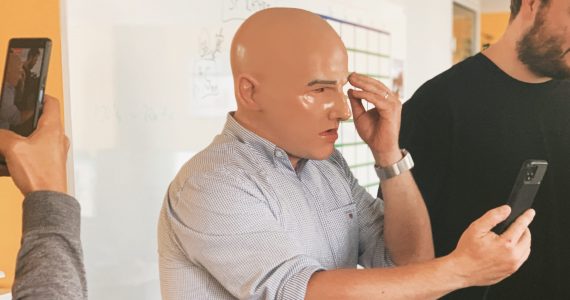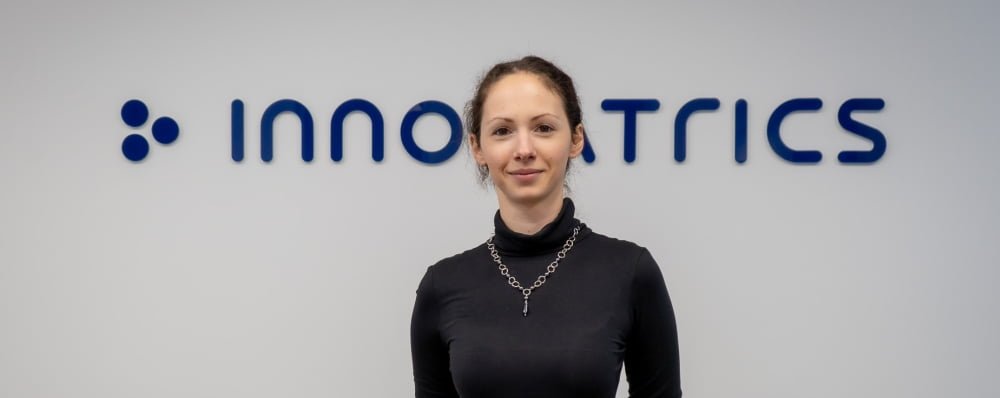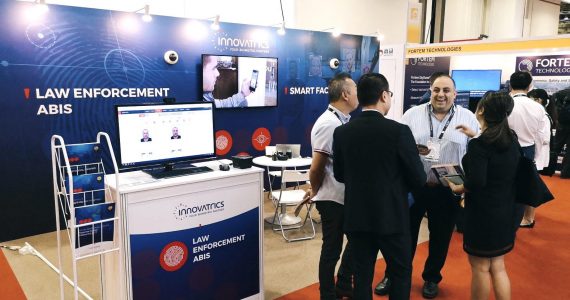
The client must decide for themselves that they need biometrics
Nina Suchánková has switched roles at Innovatrics so many times that there are only two positions left on her wishlist that she’d like to try. But as she says so herself, both will just have to wait a little while. These days, she runs the Channel Sales team, which is responsible for making our technology go global.
You’ve been working at Innovatrics for more than six years now, and you’ve changed positions multiple times after having quite literally started from the bottom. What was it like when you first started working at the company?
It was challenging as biometrics is a very specific line of work. I remember there were about 35 of us working at the company at the time, and the vast majority of my co-workers had already been working there for a few years, which only added to the initial pressure I was under. I also remember feeling anxious whenever I needed to ask my senior co-workers about something. I learned the hard way that I should always come prepared and read all the technical documentation first before going to them with questions about our products. On the flip side, their enthusiasm for the company made me feel like I was in the right place.
You say that you were basically thrown into the world of biometrics head first. Were there any transferable skills from your past IT experience that had helped you?
I had worked in IT for a few years before onboarding to Innovatrics. However, my experience in navigation technology and gaming could have never prepared me for biometrics, even on a basic level – they’re just worlds apart. It was like I was back to square one and had to start from scratch. I was taking over the position from someone who had been with the company for several years and who understood the product in great technical detail, so my first three months after joining Innovatrics were the toughest and easily the most challenging out of my entire time working at the company. I was under a lot of pressure to do a lot of things… and fast.
Do you have a technical background that came in handy at work, or did you learn everything while on the job?
When I went to a bilingual grammar school, the opportunity to be in contact with people from abroad was also met with an enthusiasm for technology. And I enjoyed reading about tech. So even back then, I had already set a goal for myself to get into IT. But the irony in that was that I didn’t want to learn programming, so I chose to major in strategic management instead. This course of study was aimed at developing strategic thinking skills, procedures for strategic implementation in business, and strategic control. Unfortunately, it wasn’t possible for me to choose a specialisation in IT firms. During my freshman year in college, I had already managed to secure a part-time position in the IT sector where I had the opportunity to learn the basics of sales. Since then, my enthusiasm for IT hasn’t fizzled out, so it was clearly the right move for me.
How would you compare all the positions you’ve had over the years?
Well, as SDK Sales Manager, I started with the smallest clients Innovatrics had at the time. I was also simultaneously running the e-shop where software (SW) licences and biometric hardware (HW) could be purchased. Later, I took on larger clients. However, the product portfolio I worked with remained the same when I switched to SME Sales Manager (small and medium-sized). After three years working at the company, I found that I was looking to deal with customers of greater complexity, so I moved to business development with a diverse range of products and took on the position of Business Development Manager for North America. I think it was the right fit for me. To sum it up, I love a good challenge and these clients and partners really put me to the test and motivated me to do well. I welcomed this responsibility with open arms and worked my way up to Head of Channel Sales.
Do you think it’s better to climb up the corporate ladder gradually? Perhaps your gradual rise to the top and your multiple positions gave you ample opportunity to ‘scope out’ what exactly Innovatrics does?
Yes, I personally think we get the most out of things when we expand our knowledge and hone our skills in a piecemeal fashion. That way, we’ll be far less caught off guard by things and we’ll gain a solid footing which we can build on. I’m also a fan of filling senior or leadership positions internally – whenever it makes sense to do so and the situation allows for it. People who have already been working for the company for a while are already better integrated and understand the company’s core values and culture, so there’s the presumption that they’ll learn the ropes of the new position much faster and will be able to work independently much sooner.
You also worked as Channel Sales Manager where you were in charge of ‘recruiting’ new business partners from around the world and educating them about Innovatrics products. What did that entail?
Channel Sales, unlike Direct Sales, works on a slightly different principle. We try to find partners who already have their own products and end customers, but who lack biometrics for a complete package. As soon as they take a liking to our technology, we do everything we can to ensure they get a grasp of how to use it, integrate it into their solutions, and are able to offer them to customers as a package deal. We look at the ‘long run’ side of things, as we expect our partnership will not stop at just one project. If we do our job right, they’ll become more or less brand ambassadors who will protect our global reputation.
You remained in this position for half a year before moving up. You now hold the position of Head of Channel Sales. How is it different from Channel Sales Manager? Is it now more about managing people under you or are you still communicating with business partners?
I started working in Channel Sales as early as 2020, as I had a double position. So it’s been over a year since I’ve been in this position. Today, I run a team that’s not quite large enough yet for me to completely stop communicating with business partners whom I liaise with at Innovatrics. I really like this part of my job and I’m enjoying it while it lasts because there’s this presumption that my agenda will be filled exclusively with personnel management and matters on a strategic level.
Will you be sad when it comes time to do more personnel management than client communication?
I don’t know about ‘sad’. It’s a natural progression to start playing a more managerial role. I will try to keep at least some clients on my agenda if the situation allows for it. After years of communicating with them, we have built good relationships and mutual trust that just can’t be transferred to someone else overnight.
Your work has led to you participating in a variety of expos and other biometrics events. What has the opportunity to participate in these events meant to you personally and to the company?
I personally prefer direct contact with people. Things tend to move faster and in the right direction as a result, unlike with phone calls or formal emails. It’s certainly good to have important information confirmed in writing, but sales are still based on human relationships. The company sees things the same way, and it’s important for the company to be visible and raise awareness. When at expos, we often give presentations on various topics, whether they’re about best practices or on specific projects that we’ve taken part in. After our presentations, people like to stop at our stand, get to know the other faces of our company and ask for more details.
What are the most interesting events you’ve attended?
You know, I’ve always looked forward to events happening outside of Europe because the whole atmosphere is just different. Everyone’s not in such a rush like they would be if the expo were in Paris, for instance, and there are flights home pretty much every hour. But a few times my co-workers and I managed to extend our trip by a few extra days so that we could do some sightseeing, take day trips, or get to know the city which we were in. Cape Town really grew on me, I would love to go back someday. On the day of the expo, it’s nearly impossible to find time to explore – we’re usually stuck on call for 10 to 12 hours.
Is it important then for a company like Innovatrics to go back to various events like these after the pandemic or to travel to the clients?
I honestly think travelling is what all our co-workers on the International Sales team miss the most. I remember the years when the team met as a team in the office for only a few weeks out of the year because we were quite literally scattered all around the world. These times have been really tough. I don’t think people really realise exactly how much time we spend on business trips getting in and out of taxis and sitting around in airport terminals, but we all hope that travel as we knew it before will return as soon as possible.
You have a lot of experience working with foreign business partners – like when you served as Business Development Manager for North America, for example – how did you perceive the differences or specifics of individual countries in terms of negotiating and ‘convincing’ them that they need biometrics?
Well, first of all, if you have to ‘convince’ someone that they need biometrics, then something is wrong. That’s not to say that biometrics wouldn’t be the right step forward from a technological standpoint, quite the contrary, but Innovatrics’ reputation has been built largely on its willingness to advise and educate partners and end customers. At the end of the day, if they decide they’re not ready for such a leap forward, or if they feel it doesn’t make much sense to them, then we fully support their decision. North America, and especially the US, is such a special market that you simply have to be there in person. It’s not enough to have an HQ in Europe; as a company there, you ideally need an address where they can reach you. Furthermore, they pay attention to references directly from the USA and paperwork, such as standards, documentation of business processes, guarantees, etc. It’s not easy to know and meet all the requirements. In contrast, you’ll have countries in South America where it’s common for your partners to switch from English mid-meeting and start speaking amongst themselves in another language, or they might even postpone what originally seemed like an urgent project by one to two years without ever giving you an adequate explanation as to why.
Have you ever had bizarre things happen while in negotiations?
Well, one interesting thing that happened to me was when our receptionist came to tell me I had a visitor waiting for me in the conference room, which was news to me. I later found out that they had flown all the way from across the globe on their own accord to collect their HW in person. I mean, we had gone over the HW three days prior, but that was over email and we never agreed on a meeting. They happily took a 20-kilo box with them and that was the last we ever heard from them.
Are there any other positions you would like to try?
Well, I suppose there’s not very many left for me to try. All that’s left on my wishlist now is to become Global Sales Director😊. And then, maybe, eventually CEO, but both of these positions are going to have to wait a few more years.
You could say you’re a ‘veteran’ employee now at Innovatrics. What do you like most about the company?
It’s so nice and motivating to be surrounded by such intelligent and clever people. What I like most is that Innovatrics is not part of some global conglomerate. We’re a Slovak company, and yet, we rank among the world’s top biometrics providers.
Could you ever picture yourself NOT working in IT? What would you be doing?
Well, I love specialty coffee and good food, so I definitely wouldn’t mind running my own small bistro or café. But I’ll just leave that as my plan B 😊.
You’re probably one of few women to hold a leadership position in the IT business…
Technology is constantly changing and it’s definitely not for lazy people. You need to stay informed and understand the technology well. People need to believe you when you insist your product is good. That’s what keeps me motivated. But as far as my gender is concerned, there might even be two levels in IT: women vs. the industry and women vs. management positions. It’s still quite a sensitive topic these days, but I’m hesitant to label it a ‘gender issue’, especially when it comes to men not letting women into IT, which I don’t think is the case. If biases, preferences, or any personal feelings towards a particular gender get mixed into the hiring process or promotions, then you’re doing it wrong. I, myself, look for people who will fit right in and who have a special skill set to offer to the team. I don’t care about their gender, and I firmly believe that this is the right way to go about it.

